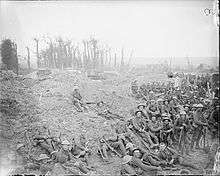41st Division (United Kingdom)
| 41st Division | |
|---|---|
 Formation patch of the 41st Division. | |
| Active | 1915–1919 |
| Country |
|
| Branch |
|
| Type | Infantry |
| Size | Division |
| Engagements |
World War I * Battle of the Somme * Battle of Messines * Battle of Passchendaele * Hundred Days Offensive |
| Commanders | |
| Notable commanders | Sydney Turing Barlow Lawford |
The 41st Division was an infantry division of the British Army, raised during World War I as part of Lord Kitchener's New Armies. The division saw service on the Western Front and later on the Italian Front.
Unit history

The division was formed as part of the fifth wave (K5) of divisions in the New Army; it did not have a regional title, but was composed primarily of recruits from the south of England. Several of its battalions had been raised by local communities and were named for their towns or industries. After training and home service, the 41st Division, commanded by Major-General Sydney Lawford, deployed overseas to reinforce the British Expeditionary Force (BEF) on the Western Front in the first week of May 1916; its first major combat came in September of that year, at the Battle of Flers–Courcelette, part of the larger Battle of the Somme.[1] After fighting in 1917 at the Battle of Messines and the Battle of Passchendaele (also known as the Third Battle of Ypres) it was transferred to the Italian Front to become part of the Italian Expeditionary Force (IEF). It remained here for three months throughout the winter of 1917–18 before returning to the Western Front, where it arrived just before the German Army launched its Spring Offensive in March. It participated in the Allied "Hundred Days Offensive" and ended the war in Flanders, from where it moved to join the Army of Occupation in Germany, following the Armistice of 11 November 1918. The 41st Division was commanded by Major-General Sydney Lawford throughout its existence and was demobilised in March 1919, with some units transferred to the 47th (1/2nd London) Division, British Army of the Rhine (BAOR). The division was not reformed after the war and did not serve in the Second World War.
Order of battle
The 41st Division was constituted as follows during the war:
- 12th (Service) Battalion (Bermondsey), East Surrey Regiment
- 15th (Service) Battalion (2nd Portsmouth), Hampshire Regiment
- 11th (Service) Battalion (Lewisham), Queen's Own (Royal West Kent Regiment) (disbanded March 1918)
- 18th (Service) Battalion (Arts and Crafts), King's Royal Rifle Corps
- 11th (Service) Battalion, Queen's (Royal West Surrey Regiment)
- 10th (Service) Battalion (Kent County), Queen's Own (Royal West Kent Regiment)
- 23rd (Service) Battalion (2nd Football), Duke of Cambridge's Own (Middlesex Regiment)
- 20th (Service) Battalion (Wearside), Durham Light Infantry (to 124th Brigade March 1918)
- 10th (Service) Battalion, Queen's (Royal West Surrey Regiment)
- 26th (Service) Battalion, Royal Fusiliers (City of London Regiment)
- 32nd (Service) Battalion, Royal Fusiliers (City of London Regiment) (disbanded March 1918)
- 21st (Service) Battalion (Yeomen Rifles), King's Royal Rifle Corps (disbanded March 1918)
- 20th (Service) Battalion (Wearside), Durham Light Infantry (from 123rd Brigade March 1918)
Pioneers
- 19th (Service) Battalion (2nd Public Works Pioneers), Duke of Cambridge's Own (Middlesex Regiment)
Battles
Notable people associated with the division
- Walter Tull
- Robert Anthony Eden, 1st Earl of Avon, Prime Minister 1955–1957
- Robert Cyril Morton Jenkins British Senior Police Officer
See also
References
- ↑ "23rd (2nd Football) Battalion, The Middlesex Regiment (Duke of Cambridge's Own)". Retrieved 4 December 2013.